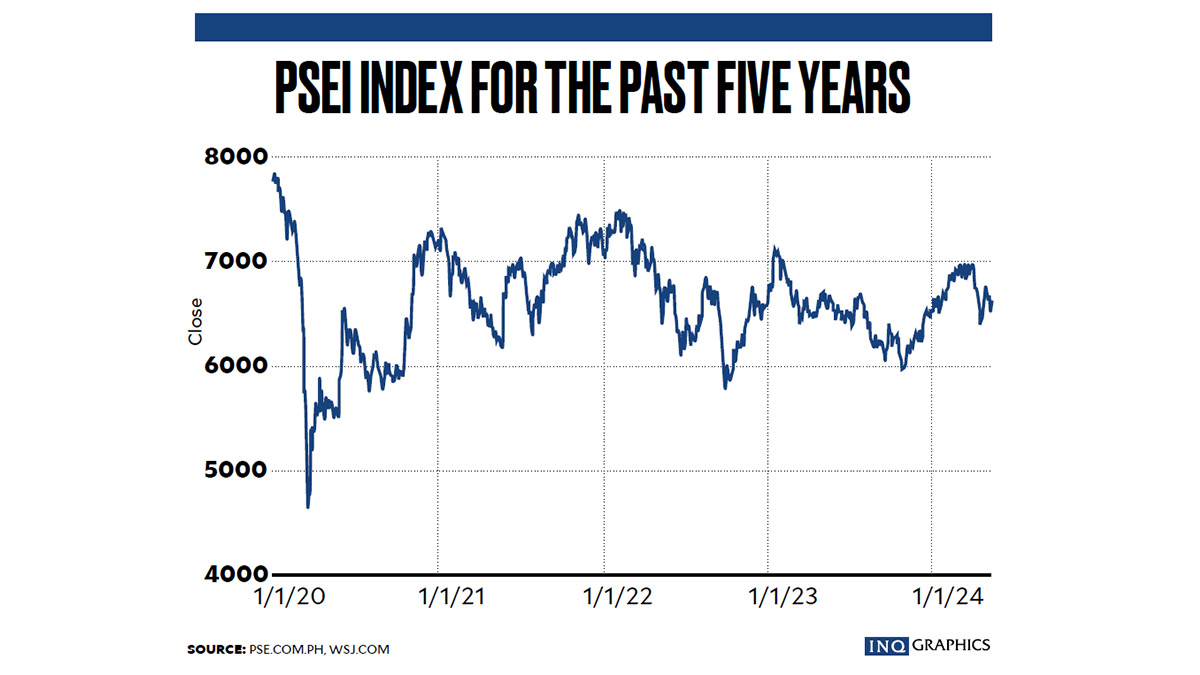
Indeed, analysts are saying that local equities have not been responding well to the policy rate stance of the Bangko Sentral ng Pilipinas (BSP), with investors trading cautiously as rate cut timing remains cloudy.
Alfred Benjamin Garcia, research head at stock brokerage house AP Securities Inc., says the market “is definitely not performing as well as we had hoped coming into 2024.”
“The prospect of higher-for-longer interest rates is keeping a cap on market gains, and we have already cut our year-end index target by almost 300 points to reflect this,” Garcia tells the Inquirer.
Initially, AP Securities’ year-end target for the Philippine Stock Exchange Index (PSEi) was 7,619, estimating an 18-percent gain. However, the high-interest rate environment prompted them to trim this to 7,355, just a 14-percent increase from the 2023 year-end close of 6,450.04.
With inflation quickening to 3.8 percent in April from 3.7 percent in March, the BSP is poised to further delay rate cuts to the fourth quarter of the year or, possibly, the first quarter of 2025.
For Rastine Mercado, research director at China Bank Securities, the absence of firmer policy rate guidelines may soften investors’ risk appetite in the coming months.
READ: Wanted: ‘Sooner than later’ Bangko Sentral rate cuts
“Given the uncertainty on rate cut timing, we think that we may see continued tepid risk appetite in the near term, and we may only see more decisive rallies by the second half as contingent on improving visibility on inflation and rate cut prospects from both the [US Federal Reserve] and the BSP,” he says in an email to the Inquirer.
According to Mercado, the PSEi — currently ranging between the 6,400 and 6,800 levels — “may remain there in the next couple of months” due to changing rate cut expectations, which have been largely dependent on the moves of the American central bank, the US Federal Reserve.
Dry spell
Mikhail Plopenio, researcher at Philstocks Financial Inc., also notes that the country’s “challenged agricultural production amid the El Niño phenomenon” is causing an uptrend in inflation, further dampening prospects of earlier rate cuts.
As a result, analysts are warning against investing in property and consumer-focused companies, as these are most affected by interest rates and prices of commodities.
Property companies will continue to struggle in the near term, Mercado says, because of the still-soft demand for residential developments.
READ: Property picks: Making the smart move in real estate
Garcia also advises investors to wait for more favorable interest rates before venturing into property firms.
Consumer retail companies are likewise affected by shifting consumer behavior, which may cause “persisting near-term weakness,” according to Mercado.
Escalating tensions in the Middle East in April also weighed down the market during the first quarter. Philippine shares had a nine-session losing streak that month as the PSEi touched the 6,400 level for the first time since January, with the market seeing its largest selloff this year.
This may remain a key risk for the rest of the year, as geopolitical tensions often lead to higher commodity prices and supply chain disruptions, Mercado says.
Bleak IPO scene
There is also less optimism about companies going public.
The Philippine Stock Exchange (PSE) expects to see up to P40 billion worth of equity deals from at least six initial public offerings (IPOs) within 2024, against three last year that raised around P13 billion.
READ: OceanaGold debuts on PSE in the red
OceanaGold Philippines Inc. was the first to take the risk, raising P6.08 billion from its IPO earlier this month. But the operator of the Didipio gold-copper mine saw its share price drop by more than 6 percent below its IPO price during its stock market debut, signaling a tough market condition for public listings.
This was among the considerations of real estate giant SM Prime Holdings Inc., which has announced a further delay in the launch of its much-awaited real estate investment trust arm, citing high interest rates and a volatile market.
But earnings are resilient
However, companies have also been delivering robust first-quarter earnings despite economic headwinds both locally and globally.
Plopenio says maintaining this performance throughout the year may sway traders and subsequently lift the market.
“The resilience of corporate earnings amid a challenging economic environment aids the market to stay afloat,” he says, adding that sustained growth may bring the PSEi above 7,000.
With all these factors in play, experts are advising investors to lean toward companies focused on power and utilities, as well as telecommunications.
Mercado points out that these sectors, particularly power, “could continue to do well” on the back of sustained volume improvements and more stable margins. Heightened interest in renewable energy is also driving growth.
There is still quite partial sentiment for banks despite their good performance in the January to March period, still due to higher-for-longer interest rates.
Meanwhile, Mercado projects “improving interest” in telcos, especially due to the growing demand for data services, as well as fresh revenue growth from new businesses like data centers.
Investors may also see light in reduced capital spending, a tactic that Ayala-led Globe Telecom Inc. wants to employ to improve its balance sheet.
For the rest of the year, analysts are leaning toward more defensive and dividend-focused companies, as these could be a good play for traders.